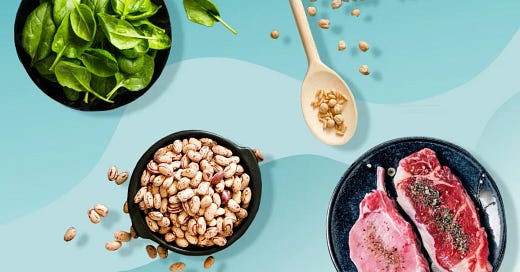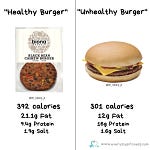Neuro Athletics is a twice-weekly newsletter designed specifically for high-performing men and women who want science-backed strategies to optimize brain health, performance, and longevity. Subscribers include executives, coaches, professional women, health-conscious mothers, and women dedicated to peak cognitive and physical performance. If you're not already subscribed, join 69,000+ people who receive actionable insights directly in their inbox each week.
Story at a Glance:
Most muscle growth comes from workouts, not protein.
Plant-based proteins are just as effective as animal proteins.
Intense, focused workouts matter more than meal planning for muscle gains.
Christopher Gardner, the Stanford nutrition powerhouse behind groundbreaking studies like DIETFITS and that infamous Netflix twin study, recently sat down with me and dropped some serious truth bombs. Here are 3 ways you can actually accelerate your muscle gains in just two weeks:
Neuro Athletes,
Protein: Overhyped or Essential?
Here’s the Truth The modern nutrition world has elevated protein to its status as the ultimate dietary goal which influencers display through expensive Instagram posts featuring shredded bodies and expensive protein powders.
The main issue which everyone avoids discussing remains: Your workout generates more than 90% of muscle growth while your protein shake contributes only a small percentage. Stanford’s Christopher Gardner reports that hypertrophy development from protein intake reaches only less than 10% of the total growth.
The fitness industry creates a massive business model which tells consumers that higher protein consumption leads to greater muscle development. The truth? You’re probably already getting enough.
The average American consumes more than 1.2 grams of protein per kilogram of body weight through their normal eating habits. The recommended dietary allowance (RDA) is surpassed by this amount which provides adequate muscle maintenance for those who regularly train.
So why all the hype? The protein industry generates profits exceeding one billion dollars annually from protein sales.
But data doesn’t lie.
What the Research Actually Says
Stu Phillips from McMaster University conducted a landmark study to examine muscle protein synthesis in resistance-trained individuals.
His conclusion?
The human body will not experience substantial muscle growth when protein intake reaches 1.6 grams per kilogram daily according to Phillips.
The amount of protein scoops you take will not multiply your muscle growth results. Resistance training combined with protein intake between 1.2–1.6g/kg will not produce the body of a Greek statue regardless of additional protein consumption.
Today’s Newsletter Is Brought To You By Momentous
You can’t push the limits of human performance on water and ambition alone.
Whether you're training for a marathon, running a business, or running after your toddler — hydration and sustained energy matter. That’s why I’ve added Momentous Fuel to my protocol.
Their newest flavor — Passion Orange Guava — isn’t just ridiculously refreshing. It’s formulated with a clean, science-backed combo of Palatinose™ (a low-GI carb) and a 3:1 glucose-to-fructose ratio, giving you energy that lasts without the crash. Add in electrolytes like sodium, potassium, magnesium, and zinc, and you’ve got full-spectrum hydration built for serious output.
And here's the kicker: $10 from every box goes to the Holo 'Ai food-sharing program in Maui, delivering up to 160,000 meals across the islandMomentous Fuel POG & Ma….
Clean fuel. Better performance. Real impact.
Use code NEURO at livemomentous.com/louisa for 35% off your first subscription.
Surprising Facts About Plant Protein vs. Animal Protein
I know, cue the outrage from the carnivore crowd. But listen: Plant proteins contain all essential amino acids including leucine which is considered the most important amino acid for muscle growth. Athletes maintained equal strength and performance levels according to Stanford studies when following vegan diets instead of meat-based diets even though they consumed less total protein.
The DIETFITS study demonstrated that diet quality proved more important than diet type for both low-carb and low-fat eating plans. People who focused on whole foods instead of processed foods achieved superior results regarding muscle preservation and health benefits. Replace one daily animal protein meal with a plant-based protein meal to see improvements in your health. Beans along with lentils and chickpeas provide benefits to your digestive system and your muscles.
Proven Ways to Maximize Workouts (Instead of Obsessing Over Meals)
The lifts not increasing indicate the problem likely lies outside your macros. Your mindset in the gym plays a larger role than your lifts do. Too many women and other users achieve their daily protein requirements and maintain strict dietary habits yet their strength and muscle growth remain stagnant.
Here’s why: Muscles don’t grow because you meal-prepped. They grow because you pushed your body to adapt.
1. Lift Heavier (Even When It’s Uncomfortable) Dr. Stacy Sims demonstrates this principle through her performance physiology research. Women should lift heavy weights because lifting heavy weights stimulates true muscle adaptation according to
Dr. Stacy Sims who leads research in performance physiology. The weightlifting approach requires 3 to 4 repetitions in each set whereas most HIIT classes and YouTube workouts perform 12 to 15 repetitions. High-intensity weightlifting with reduced rep ranges activates fast-twitch muscle fibers to boost neuromuscular performance which drives both strength development and body composition transformations.
2. Train to the Edge of Failure
According to a Journal of Applied Physiology study which was published the results show: Higher intensity resistance training produces better muscle growth and strength development than lower intensity workouts when total workout volume remains equal.
Translation? You’ve got to get uncomfortable.
Your muscle growth will suffer if you reserve any reps from your sets. The duration of your workout matters less than your proximity to the maximum limit you can achieve.
3. Progressively Overload—Every. Single. Week.
Progressive overload isn’t just a nice-to-have—it’s a non-negotiable. Track your lifts. Add weight. Add reps. Reduce rest. Force adaptation. When your workouts feel easy there is a serious issue. Building muscle tissue occurs when your body experiences stress through tension and fatigue instead of feeling comfortable.
Reality Check: Muscles Don’t Grow on Salads Having an optimal meal plan and 100% macronutrient intake does not guarantee muscle growth when your training is inadequate.
The truth?
Most people believe they are training with maximum intensity. A true stimulus for change requires your heart rate to rise and your grip to weaken and your face to contort in pain while exercising.
Give the entire episode a listen, you won’t be sorry!














Share this post